China Arts & Entertainment
China’s Top TV Dramas to Watch This Winter 2017/2018
China’s top television dramas to binge on this winter – by What’s on Weibo.
Published
6 years agoon
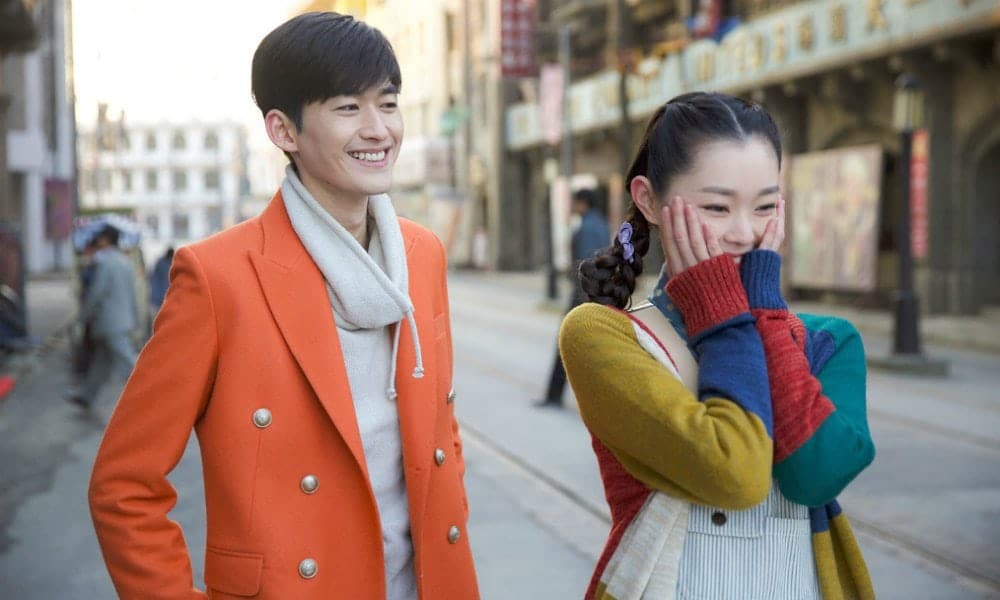
From historical dramas to military series – a list of the latest, most-watched television dramas in China shows that Chinese television dramas are not just hot & happening – they are also diverse when it comes to themes and genres.
It has been over 27 years since China’s first television drama aired and caused a national craze. Although China’s media industry has greatly changed through the times, one thing has remained the same: Chinese TV viewers still love watching television dramas – a dominant form of media entertainment. In fact, the Chinese TV drama industry is booming and among the most vibrant in the world, with no signs of slowing down.
As the days are getting colder and darker, it is time to curl up on the couch to do some tv drama (binge) watching. China has seen a myriad of new television dramas this year, with some of the more popular ones airing this winter.
This is a top 10 of most popular new dramas according to Weibo’s charts and the Sohu hot charts at the time of writing. We have added various links on where to watch these series, but they might change overtime – please post relevant links in the comment section below.
Some dramas are only licensed for certain regions. For those who wish to switch between regions on their desktop or mobile, you can use a VPN. Our friends at NordVPN offer excellent services (check out here).
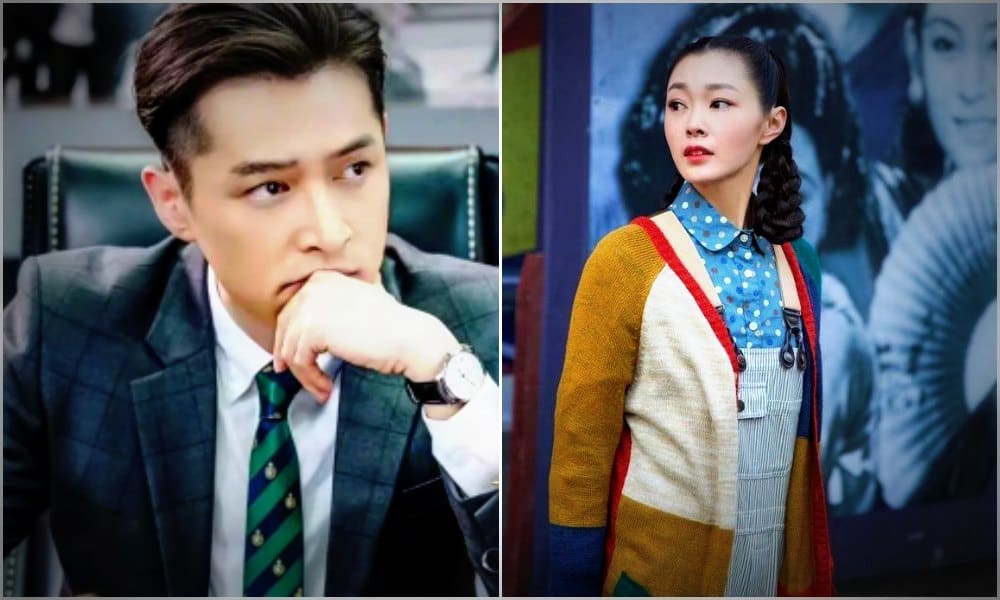
From the Game of Hunting (l) and The Legendary Tycoon.
For weekly updates on the top online ratings of Chinese television series, check out Cdramabase.com, an excellent website run by Alice Craciun providing insights into the world of Chinese drama.
#10. Peacekeeping Infantry Battalion #维和步兵营#

Genre: Military drama
Release date: October 10, 2017 (35 episodes)
Network: Jiangsu TV
Directed by: Ning Haiqiang (宁海强), Yi Xiang (翌翔)
‘Peacekeeping Infantry Battalion’ is a different military drama than the mainstream series within this genre; it is not focused on Sino-Japanese War, but on modern-day conflicts. This drama has received much praise from Chinese experts.
Its airing comes at a time when China’s role in UN peacekeeping is becoming increasingly crucial, not just as a contributor of troops, but also as a financial provider. The drama, attracting large audiences across China, plays an important role in the current shaping of the image of China’s peacekeeping troops.
The drama was co-directed by director Ning Haiqiang, who is also known for multiple military productions such as The Hundred Regiments Offensive (百团大战), and aims to show how Chinese peacekeeping forces are selected, trained, and go abroad. The drama mainly focuses on the tumultuous story of people in the Peacekeeping Infantry Battalion, who are risking their own lives to evacuate citizens from Libya during a dangerous mission. And, of course, it would not be a proper Chinese drama without some romance amidst all the military developments.
To check out the drama (in Chinese) see this YouTube channel.
Starring: Du Chen (杜淳), Jia Qing (贾青), Xu Honghao (徐洪浩), He Da (何达), Liu Runnan (刘润南), Shen Hao (沈浩).
#9. Detective Dee #通天狄仁杰#
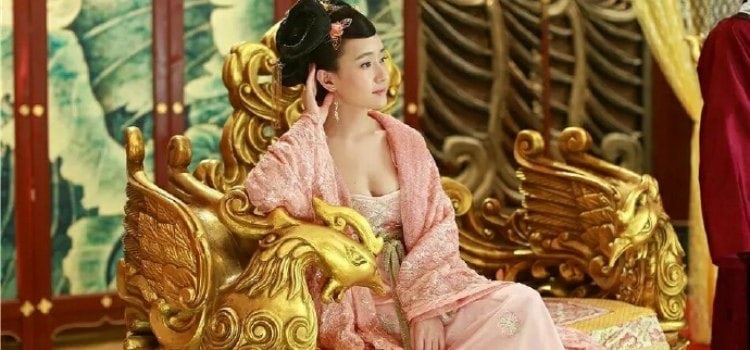
Genre: Costume drama, detective
Release date: August 21 2017 (46 episodes)
Network: Beijing TV, Anhui TV
Directed by: Xie Zhaoyi (叶昭仪)
This is a large-scale costume drama that was already produced back in 2014. It focuses on the main character Di Renjie, which is played by actor Ren Jialun, who also starred in the drama Noble Aspirations (青云志).
Drama blog DramaPanda describes Detective Dee as a “Chinese equivalent to Sherlock Holmes” who actually lived during the reign of Empress Wu Zetian (624-705). He’s become a widely fictionalized character.
The drama shows the trials and tribulations of Di Renjie, as he is falsely accused of a crime he did not commit and then discovers he has special talents for solving cases.
Watch it on CCAsian here.
Starring: Ren Jialun (任嘉伦, also known as Allen Ren), Kan Qingzi (阚清子), Jiao Junyan (焦俊艳), Chen Yi (陈奕), Miao Junjie (缪俊杰).
#8. Green Love 青恋
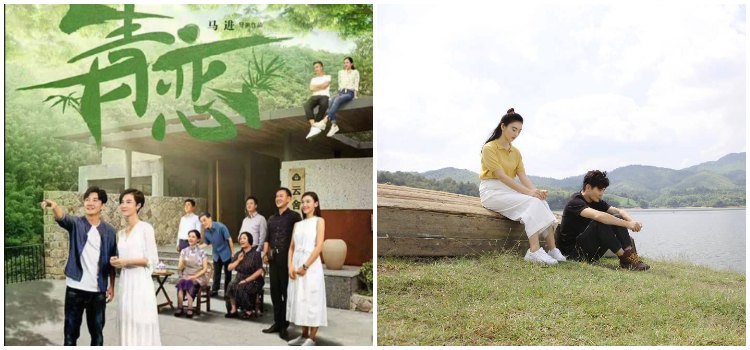
Genre: Romance, family, rural
Release date: October 18, 2017 (26 episodes)
Network: CCTV-1, Zhejiang TV (where it started airing October 31st)
Directed by: Ma Jin (马进)
‘Green Love’ (Qinglian) is the only tv drama in this list that is themed around rural life in China – although it is about urban youth at the same time. It tells the story of the 28-year-old man Lin Shen (starring Guo Jingfei) who returns to his hometown of Yunshe village after establishing his own company in Shanghai.
As described by Cdramabase, he is not the only one turning to this village after building on a career in the big city. Investor Chen Ling (by Che Xiao) wants to escape the busy city and visits Lin Shen’s village, where she learns to appreciate Chinese village life.
Starring: Guo Jingfei (郭京飞), Che Xiao (车晓), Una You (尤靖茹).
#7. The Legendary Tycoon #传奇大亨#
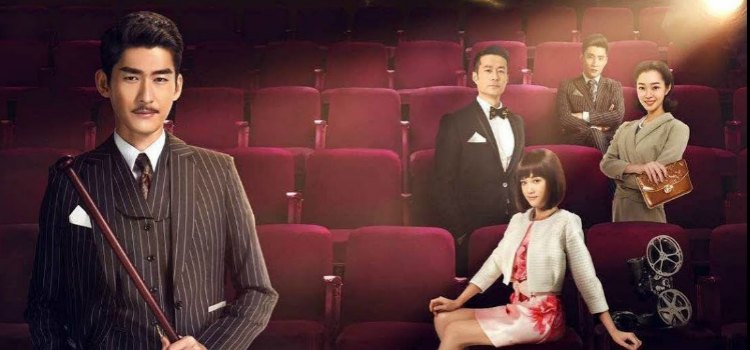
Genre: Period drama
Release date: October 9, 2017
Network: Zhejiang TV, Tencent, iQiYi, Youku
Directed by: Zhuang Xunxin (庄训鑫)
With 110 million views on Weibo #传奇大亨#, this is a popular Chinese drama and a quite original one because it is based on a real-life story.
This drama takes place in Shanghai during the 1930s, when the brothers of the ‘Gu family’ join the movie industry. Gu Yanmei, played by actor Zhang Han, is the youngest brother, who follows his older brother Gu Ruoxia to Singapore to start their own film business there. When war breaks out, the brothers decide to move their film production base to Hong Kong – the start of a tumultuous and flourishing career.
The Legendary Tycoon is based on the story of the Shaw Brothers, of whom the youngest, Run Shaw, passed away in 2014, at the age of 107 (Find a short history of the Shaw Brothers & Chinese cinema here).
See the first episode of this drama here (in Chinese), or through Viki with English subtitles here.
Starring: Zhang Han (张翰), Jia Qing (贾青), Chen Qiao’en (陈乔恩), Song Yi (宋轶) Tan Kai (谭凯), Liu Changde (刘长德) Guo Ziqian (郭子千) Yao Zhuojun (姚卓君) Sun Wei (孙玮).
#6. Xuan Yuan Sword: Legend of the Han Clouds #轩辕剑之汉之云#
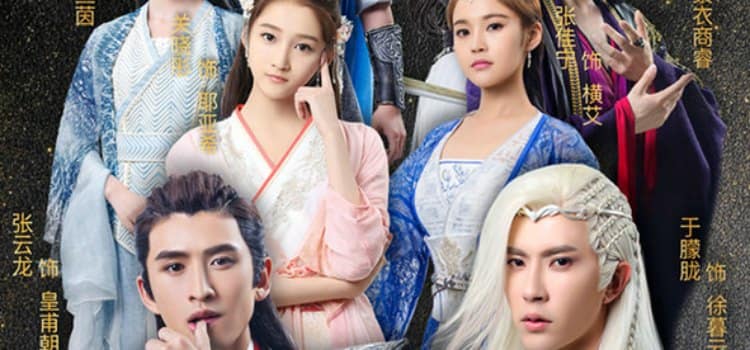
Genre: Fantasy, sci-fi, costume
Release date: August 8 2017 (58 episodes)
Network: Dragon TV
Directed by: Pan Wenjie (潘文杰), Jin Sha (金沙)
‘Xuan Yuan Sword: Legend of the Han Clouds’ is set during a fantasy era and revolves around three opposing kingdoms and the heroic accomplishments of the young protagonists. That these kinds of fantasy spectacles are still very popular amongst netizens can be viewed on this drama’s Weibo hashtag page, which had received 2,2 billion views by the time of writing.
The show can be viewed with English subs on Youtube here or through Viki.
Starring: Zhang Yunlong (张云龙), Yu Menglong (于朦胧), Guan Xiaotong (关晓彤), Zhang Jiazhu (张佳宁).
#5. My! Physical Education Teacher #我的!体育老师#

Genre: Romance, comedy
Release date: 11 November 2017 (38 episodes)
Network: Hunan TV
Directed by: Lin Yan (林妍)
The pretty Wang Xiaomi had always dreamed of being treated like a princess by her future husband. The much older Mark (Zhang Jiayi), who is facing a mid-life crisis, is her ideal candidate. But dealing with her new stepdaughter and restless husband is not the pampered life Wang had hoped for.
The drama comically features the generational differences between those born in the post-70s, post-80s, post-90s, and those born after 2000.
The drama can be watched online through CCAsian here.
Starring: Zhang Jiayi (张嘉译), Wang Xiaochen (王晓晨), Wang Weiwei (王维维), Zhang Zijian (张子健), Zhao Jinmai (赵今麦)
#4. Ordinary Person #凡人的品格#

Genre: Urban drama, workplace
Release date: October 28, (45 episodes)
Alternative title: Ordinary Person Character
Network: Jiangsu TV, Zhejiang TV
Directed by: Xu Zongzheng (徐宗政)
This drama’s narrative follows the story of several people who work together at a media company. While war reporter-turned-producer Zhan Dapeng (played by Lin Yongjian) is facing a crisis both in his working and personal life, the pretty industry newbie Chang Ge (Jiang Xin) is an admirer of Zhan. The two encounter many challenges while working on a new program together – they’re both partners and enemies at the same time.
Check it out (in Chinese) on Youtube here.
Starring: Lin Yongjian (林永健), Jiang Xin (蒋欣), Tong Lei (童蕾), Liang Zhenlun (梁振伦), Bai Zhidi (白志迪).
#3. The Endless Love #路从今夜白#

Genre: Romance
Release date: 11 November 2017 (32 episodes)
Alternative title: The Journey from Tonight is White
Network: Hunan TV, Mango TV
Directed by: Gu Yunyun (顾贇贇)
This drama, that is based on a novel by Mo Wu Bi Ge, revolves around the love story of the talented painter Gu Yebai (played by Chen Ruoxuan) and the amiable Lu Youyan (An Yuexi). When Gu is getting ready to prepare for a major art competition, psychological problems are challenging his journey. A new love blossoms when Lu Youyan helps him overcome his problems, but their relationship faces more obstacles as the drama unfolds.
This drama can be watched through Viki.com with subtitles (if it is licensed for your region).
Starring: Chen Ruoxuan (陈若轩), An Yuexi (安悦溪), Wei Miles (魏哲鸣), Luo Yutong (罗玉通), Clinton Kuang (匡牧野).
#2. ER Doctors ##急诊科医生##

Genre: Hospital drama
Release date: October 30, 2017 (43 episodes)
Network: Dragon TV, Beijing TV
Directed by: Zheng Xiaolong (郑晓龙), Liu Xuesong (刘雪松)
The television drama ‘ER Doctors’ (#急诊科医生#) is not just one of the highest-ranking tv dramas this winter, but also one of the most viewed and discussed topics on Weibo.
ER Doctors is a realistic drama that centers around a group of doctors at a hospital’s emergency department.
It tells the story of the ER room head doctor of the emergency department He Jian Yi (Zhang Jiayi) and the new Ph.D. advisor, who just returned from America, Jiang Xiaoqi (by Wang Luodan). At first, these two are wary of each other, but they come to understand each other and rescue not only patients side by side but also themselves in the end (Cdramabase).
According to Shanghai Daily, director Zheng attached great importance to the details in every scene, which is why he visited a Shanghai hospital with the drama’s cast to learn basic ER training.
Starring: Zhang Jiayi (张嘉译), Wang Luodan (王珞丹), Jiang Shan (江珊)
#1. Game of Hunting #猎场#
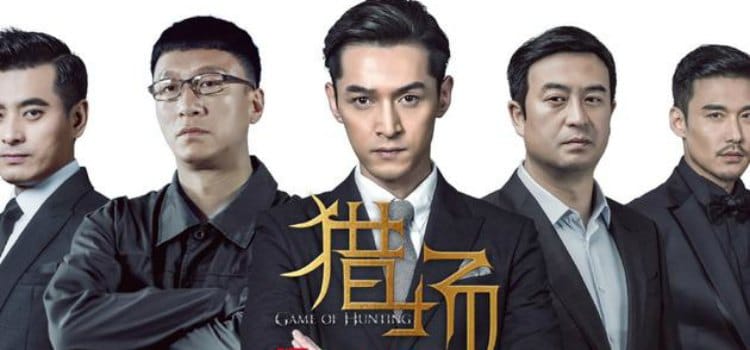
Genre: Romance, workplace
Release date: November 6, 2017 (52 episodes)
Alternative title: Hunting Ground
Network: Hunan TV, Youku, LeTv and more.
Directed by: Jiang Wei (姜伟) (also screenplay)
The Game of Hunting is the absolute number 1 of this list, currently topping the top lists of most popular dramas on Weibo and Sogu, and receiving a 9.0 rating from viewers.
The drama’s narrative revolves around headhunter Zheng Qiudong (played by Hu Ge) as he struggles to climb up in the financial world – a “hunting ground” full of enemies and immoral characters. When his business falls apart, he has to start anew with the help of this new alliances.
The show is heavily sponsored by One Plus (一加手机), one of China’s most popular domestic smartphone brands.
Game of Hunting can be watched online through multiple channels, including YouTube.
Starring: Hu Ge 胡歌, Chen Long 陈龙, Sun Honglei 孙红雷, Zhang Jiayi 张嘉译, Zu Feng 祖峰.
Want to know more? Also see
– Top 5 Chinese TV Dramas of Summer 2017
– Top 10 Chinese Television Dramas Early 2017
– Top 10 TV dramas in China 2016
By Manya Koetse
Follow @whatsonweibo
Spotted a mistake or want to add something? Please let us know in comments below or email us.
©2017 Whatsonweibo. All rights reserved. Do not reproduce our content without permission – you can contact us at info@whatsonweibo.com.
Manya Koetse is the founder and editor-in-chief of whatsonweibo.com. She is a writer, public speaker, and researcher (Sinologist, MPhil) on social trends, digital developments, and new media in an ever-changing China, with a focus on Chinese society, pop culture, and gender issues. She shares her love for hotpot on hotpotambassador.com. Contact at manya@whatsonweibo.com, or follow on Twitter.

China Arts & Entertainment
“Old Bull Eating Young Grass”: 86-Year-Old Chinese Painter Fan Zeng Marries 36-Year-Old Xu Meng
Online reactions to the news of Fan’s marriage to Xu Meng, his fourth wife, reveal that the renowned artist is not particularly well-liked among Chinese netizens.
Published
1 week agoon
April 18, 2024
The recent marriage announcement of the renowned Chinese calligrapher/painter Fan Zeng and Xu Meng, a Beijing TV presenter 50 years his junior, has sparked online discussions about the life and work of the esteemed Chinese artist. Some netizens think Fan lacks the integrity expected of a Chinese scholar-artist.
Recently, the marriage of a 86-year-old Chinese painter to his bride, who is half a century younger, has stirred conversations on Chinese social media.
The story revolves around renowned Chinese artist, calligrapher, and scholar Fan Zeng (范曾, 1938) and his new spouse, Xu Meng (徐萌, 1988). On April 10, Fan announced their marriage through an online post accompanied by a picture.
In the picture, Fan is seen working on his announcement in calligraphic form.

Fan Zeng announces his marriage on Chinese social media.
In his writing, Zeng shares that the passing of his late wife, three years ago, left him heartbroken, and a minor stroke also hindered his work. He expresses gratitude for Xu Meng’s care, which he says led to his physical and mental recovery. Zeng concludes by expressing hope for “everlasting harmony” in their marriage.
Fan Zeng is a calligrapher and poet, but he is primarily recognized as a contemporary master of traditional Chinese painting. Growing up in a well-known literary family, his journey in art began at a young age. Fan studied under renowned mentors at the Academy of Fine Arts in Beijing, including Wu Zuoren, Li Keran, Jiang Zhaohe, and Li Kuchan.
Fan gained global acclaim for his simple yet vibrant painting style. He resided in France, showcased his work in numerous exhibitions worldwide, and his pieces were auctioned at Sotheby’s and Christie’s in the 1980s.[1] One of Fan’s works, depicting spirit guardian Zhong Kui (钟馗), was sold for over 6 million yuan (828,000 USD).

Zhong Kui in works by Fan Zeng.
In his later years, Fan Zeng transitioned to academia, serving as a lecturer at Nankai University in Tianjin. At the age of 63, he assumed the role of head of the Nankai University Museum of Antiquities, as well as holding various other positions from doctoral supervisor to honorary dean.
By now, Fan’s work has already become part of China’s twentieth-century art history. Renowned contemporary scholar Qian Zhongshu once remarked that Fan “excelled all in artistic quality, painting people beyond mere physicality.”
A questionable “role model”
Fan’s third wife passed away in 2021. Later, he got to know Xu Meng, a presenter at China Traffic Broadcasting. Allegedly, shortly after they met, he gifted her a Ferrari, sparking the beginning of their relationship.

A photo of Xu and her Hermes Birkin 25 bag has also been making the rounds on social media, fueling rumors that she is only in it for the money (the bag costs more than 180,000 yuan / nearly 25,000 USD).
On Weibo, reactions to the news of Fan’s marriage to Xu Meng, his fourth wife, reveal that the renowned artist is not particularly well-liked among netizens. Despite Fan’s reputation as a prominent philanthropist, many perceive his recent marriage as yet another instance of his lack of integrity and shamelessness.

Fan Zeng and Xu Meng. Image via Weibo.
One popular blogger (@好时代见证记录者) sarcastically wrote:
“Warm congratulations to the 86-year-old renowned contemporary erudite scholar and famous calligrapher Fan Zeng, born in 1938, on his marriage to Ms Xu Meng, a 50 years younger 175cm tall woman who is claimed to be China’s number one golden ratio beauty. Mr Fan Zeng really is a role model for us middle-aged greasy men, as it makes us feel much less uncomfortable when we’re pursuing post-90s youngsters as girlfriends and gives us an extra shield! Because if contemporary Confucian scholars [like yourself] are doing this, then we, as the inheritors of Confucian culture, can surely do the same!“
Various people criticize the fact that Xu Meng is essentially just an aide to Fan, as she can often be seen helping him during his work. One commenter wrote: “Couldn’t he have just hired an assistant? There’s no need to turn them into a bed partner.”
Others think it’s strange for a supposedly scholarly man to be so superficial: “He just wants her for her body. And she just wants him for his inheritance.”
“It’s so inappropriate,” others wrote, labeling Fan as “an old bull grazing on young grass” (lǎoniú chī nèncǎo 老牛吃嫩草).
Fan is not the only well-known Chinese scholar to ‘graze on young grass.’ The famous Chinese theoretical physicist Yang Zhenning (杨振宁, 1922), now 101 years old, also shares a 48-year age gap with his wife Weng Fen (翁帆). Fan, who is a friend of Yang’s, previously praised the love between Yang and Weng, suggesting that she kept him youthful.

Older photo posted on social media, showing Fan attending the wedding ceremony of Yang Zhenning and his 48-year-younger partner Weng Fen.
Some speculate that Fan took inspiration from Yang in marrying a significantly younger woman. Others view him as hypocritical, given his expressions of heartbreak over his previous wife’s passing, and how there’s only one true love in his lifetime, only to remarry a few years later.
Many commenters argue that Fan Zeng’s conduct doesn’t align with that of a “true Confucian scholar,” suggesting that he’s undeserving of the praise he receives.
“Mr. Wang from next door”
In online discussions surrounding Fan Zeng’s recent marriage, more reasons emerge as to why people dislike him.
Many netizens perceive him as more of a money-driven businessman rather than an idealistic artist. They label him as arrogant, critique his work, and question why his pieces sell for so much money. Some even allege that the only reason he created a calligraphy painting of his marriage announcement is to profit from it.
Others cast doubt on his status as a Chinese calligraphy ‘grandmaster,’ noting that his calligraphy style is not particularly impressive and may contain typos or errors. His wedding announcement calligraphy appears to blend traditional and simplified characters.

Netizens have pointed out what looks like errors or typos in Fan’s calligraphy.
Another source of dislike stems from his history of disloyalty and his feud with another prominent Chinese painter, Huang Yongyu (黄永玉). Huang, who passed away in 2023, targeted Fan Zeng in some of his satirical paintings, including one titled “When Others Curse Me, I Also Curse Others” (“人骂我,我亦骂人”). He also painted a parrot, meant to mock Fan Zeng’s unoriginality.

Huang Yongyu made various works targeting Fan Zeng.
In retaliation, Fan produced his own works mocking Huang, sparking an infamous rivalry in the Chinese art world. The two allegedly almost had a physical fight when they ran into each other at the Beijing Hotel.

Fan Zeng mocked Huang Yongyu in some of his works.
Fan and Huang were once on good terms though, with Fan studying under Huang at the Central Academy of Fine Arts in Beijing. Through Huang, Fan was introduced to the renowned Chinese novelist Shen Congwen (沈从文, 1902-1988), Huang’s first cousin and lifelong friend. As Shen guided Fan in his studies and connected him with influential figures in China’s cultural circles, their relationship flourished.
However, during the Cultural Revolution, when Shen was accused of being a ‘reactionary,’ Fan Zeng turned against him, even going as far as creating big-character posters to criticize his former mentor.[2] This betrayal not only severed the bond between Shen and Fan but also ended Fan’s friendship with Huang, and it is still remembered by people today.
Fan Zeng’s behavior towards another former mentor, the renowned painter Li Kuchan (李苦禪, 1899-1983), was also controversial. Once Fan gained fame, he made it clear that he no longer respected Li as his teacher. Li later referred to Fan as “a wolf in sheep’s clothes,” and apparently never forgave him. Although the exact details of their falling out remain unclear, some blame Fan for exploiting Li to further his own career.
There are also some online commenters who call Fan Zeng a “Mr Wang from next door” (隔壁老王), a term jokingly used to refer to the untrustworthy neighbor who sleeps with one’s wife. This is mostly because of the history of how Fan Zeng met his third wife.
Fan’s first wife was the Chinese female calligrapher Lin Xiu (林岫), who came from a wealthy family. During this marriage, Fan did not have to worry about money and focused on his artistic endeavours. The two had a son, but the marriage ended in divorce after a decade. Fan’s second wife was fellow painter Bian Biaohua (边宝华), with whom he had a daughter. It seems that Bian loved Fan much more than he loved her.
It is how he met his third wife that remains controversial to this day. Nan Li (楠莉), formerly named Zhang Guiyun (张桂云), was married to performer Xu Zunde (须遵德). Xu was a close friend of Fan, and helped him out when Fan was still poor and trying to get by while living in Beijing’s old city center.
Wanting to support Fan’s artistic talent, Xu let Fan Zeng stay over, supported him financially, and would invite him for meals. Little did he know that while Xu was away to work, Fan enjoyed much more than meals alone; Fan and Xu’s wife engaged in a secret decade-long affair.
When the affair was finally exposed, Xu Zunde divorced his wife. Still, they would use his house to meet and often locked him out. Three years later, Nan Li officially married Fan Zeng. Xu not only lost his wife and friend but also ended up finding his house emptied, his two sons now bearing Fan’s surname.
When Nan Li passed away in 2021, Fan Zeng published an obituary that garnered criticism. Some felt that the entire text was actually more about praising himself than focusing on the life and character of his late wife, with whom he had been married for forty years.

Fan Zeng and his four wives
An ‘old pervert’, a ‘traitor’, a ‘disgrace’—there are a lot of opinions circulating about Fan that have come up this week.
Despite the negativity, a handful of individuals maintain a positive outlook. A former colleague of Xu Meng writes: “If they genuinely like each other, age shouldn’t matter. Here’s to wishing them a joyful marriage.”
By Manya Koetse
[1]Song, Yuwu. 2014. Biographical Dictionary of the People’s Republic of China. United Kingdom: McFarland & Company, 76.
[2]Xu, Jilin. 2024. “Xu Jilin: Are Shen Congwen’s Tears Related to Fan Zeng?” 许纪霖:沈从文的泪与范曾有关系吗? The Paper, April 15. https://www.thepaper.cn/newsDetail_forward_27011031. Accessed April 17, 2024.
Independently reporting China trends for over a decade. Like what we do? Support us and get the story behind the hashtag by subscribing:
Spotted a mistake or want to add something? Please let us know in comments below or email us. First-time commenters, please be patient – we will have to manually approve your comment before it appears.
©2024 Whatsonweibo. All rights reserved. Do not reproduce our content without permission – you can contact us at info@whatsonweibo.com.
China Memes & Viral
Chengdu Disney: The Quirkiest Hotspot in China
How a senior activity park in Chengdu was ‘Disneyfied’ and became a viral hotspot.
Published
2 weeks agoon
April 12, 2024
How did a common park turn into a buzzing hotspot? By mixing online trends with real-life fun, blending foreign styles with local charm, and adding a dash of humor and absurdity, Chengdu now boasts its very own ‘Chengdu Disney’. We explain the trend.
– By Manya Koetse, co-authored by Ruixin Zhang
Have you heard about Chengdu Disney yet? If not, it’s probably unlike anything you’d imagine. It’s not actually a Disney theme park opening up in Chengdu, but it’s one of the city’s most viral hotspots these days.
What is now known as ‘Chengdu Disney’ all over the Chinese internet is actually a small outdoor park in a residential area in Chengdu’s Yulin area, which also serves as the local senior fitness activity center.
Crowds of young people are coming to this area to take photos and videos, hang out, sing songs, cosplay, and be part of China’s internet culture in an offline setting.
Once Upon a Rap Talent Show
The roots of ‘Chengdu Disney’ can be traced back to the Chinese hip-hop talent show The Rap of China (中国新说唱), where a performer named Nuomi (诺米), also known as Lodmemo, was eliminated by Chinese rapper Boss Shady (谢帝 Xièdì), one of the judges on the show.
Nuomi felt upset about the elimination and a comment made by his idol mentor, who mistakenly referred to a song Nuomi made for his ‘grandma’ instead of his grandfather. His frustration led to a viral livestream where he expressed his anger towards his participation in The Rap of China and Boss Shady.
However, it wasn’t only his anger that caught attention; it was his exaggerated way of speaking and mannerisms. Nuomi, with his Sichuan accent, repeatedly inserted English phrases like “y’know what I’m saying” and gestured as if throwing punches.
His oversized silver chain, sagging pants, and urban streetwear only reinforce the idea that Nuomi is trying a bit too hard to emulate the fashion style of American rappers from the early 2000s, complete with swagger and street credibility.

Lodmemo emulates the style of American rappers in the early 2000s, and he has made it his brand.
Although people mocked him for his wannabe ‘gangsta’ style, Nuomi embraced the teasing and turned it into an opportunity for fame.
He decided to create a diss track titled Xiè Tiān Xièdì 谢天谢帝, “Thank Heaven, Thank Emperor,” a word joke on Boss Shady’s name, which sounds like “Shady” but literally means ‘Thank the Emperor’ in Chinese. A diss track is a hip hop or rap song intended to mock someone else, usually a fellow musician.
In the song, when Nuomi disses Boss Shady (谢帝 Xièdì), he raps in Sichuan accent: “Xièdì Xièdì wǒ yào diss nǐ [谢帝谢帝我要diss你].” The last two words, namely “diss nǐ” actually means “to diss you” but sounds exactly like the Chinese word for ‘Disney’: Díshìní (迪士尼). This was soon picked up by netizens, who found humor in the similarity; it sounded as if the ‘tough’ rapper Nuomi was singing about wanting to go to Disney.

Nuomi and his diss track, from the music video.
Nuomi filmed the music video for this diss track at a senior activity park in Chengdu’s Yulin subdistrict. The music video went viral in late March, and led to the park being nicknamed the ‘Chengdu Disney.’
The particular exercise machine on which Nuomi performed his rap quickly became an iconic landmark on Douyin, as everyone eagerly sought to visit, sit on the same see-saw-style exercise machine, and repeat the phrase, mimicking the viral video.

What began as a homonym led to people ‘Disneyfying’ the park itself, with crowds of visitors flocking to the park, some dressed in Disney-related costumes.

This further developed the concept of a Chengdu ‘Disney’ destination, turning the park playground into the happiest place in Yulin.
Chengdu: China’s Most Relaxed Hip Hop Hotspot
Chengdu holds a special place in China’s underground hip-hop scene, thanks to its vibrant music culture and the presence of many renowned Chinese hip-hop artists who incorporate the Sichuan dialect into their songs and raps.
This is one reason why this ‘Disney’ meme happened in Chengdu and not in any other Chinese city. But beyond its musical significance, the playful spirit of the meme also aligns with Chengdu’s reputation for being an incredibly laid-back city.
In recent years, the pursuit of a certain “relaxed feeling” (sōngchígǎn 松弛感) has gained popularity across the Chinese internet. Sōngchígǎn is a combination of the word for “relaxed,” “loose” or “lax” (松弛) and the word for “feeling” (感). Initially used to describe a particular female aesthetic, the term evolved to represent a lifestyle where individuals strive to maintain a relaxed demeanor, especially in the face of stressful situations.
🌟 Attention!
For 11 years, What’s on Weibo has remained a 100% independent blog, fueled by my passion to write about China’s digital culture and online trends. Over a year ago, we introduced a soft paywall to ensure the sustainability of this platform. I’m grateful to all our loyal readers who’ve subscribed since 2022. Your support has been invaluable. But we need more subscribers to continue our work. If you appreciate our content and want to support independent China reporting, please consider becoming a subscriber. Your support keeps What’s on Weibo going strong!
The concept gained traction online in mid-2022 when a Weibo user shared a story of a family remaining composed when their travel plans were unexpectedly disrupted due to passport issues. Their calm and collected response inspired the adoption of the “relaxed feeling” term (also read here).
Central to embodying this sense of relaxation is being unfazed by others’ opinions and avoiding unnecessary stress or haste out of fear of judgment.
Nowadays, Chinese cities aim to foster this sense of sōngchígǎn. Not too long ago, there were many hot topics suggesting that Chengdu is the most sōngchí 松弛, the most relaxed city in China.
This sentiment is reflected in the ‘Chengdu Disney’ trend, which both pokes fun at a certain hip-hop aesthetic deemed overly relaxed—like the guys who showed up with sagging pants—and embraces a carefree, childlike silliness that resonates with the city’s character and its people.

Mocking sagging pants at ‘Chengdu Disney.’
Despite the influx of visitors to the Chengdu Disney area, authorities have not yet significantly intervened. Community notices urging respect for nearby residents and the presence of police officers to maintain order indicate a relatively hands-off approach. For now, it seems most people are simply enjoying the relaxed atmosphere.
Being Part of the Meme
An important aspect that contributes to the appeal of Chengdu Disney is its nature as an online meme, allowing people to actively participate in it.

Scenes from Chengdu Disney, images via Weibo.
China has a very strong meme culture. Although there are all kinds of memes, from visual to verbal, many Chinese memes incorporate wordplay. In part, this has to do with the nature of Chinese language, as it offers various opportunities for puns, homophones, and linguistic creativity thanks to its tones and characters.
The use of homophones on Chinese social media is as old as Chinese social media itself. One of the most famous examples is the phrase ‘cǎo ní mǎ’ (草泥马), which literally means ‘grass mud horse’, but is pronounced in the same way as the vulgar “f*ck your mother” (which is written with three different characters).
In the case of the Chengdu Disney trend, it combines a verbal meme—stemming from the ‘diss nǐ’ / Díshìní homophone—and a visual meme, where people gather to pose for videos/photos in the same location, repeating the same phrase.
Moreover, the trend bridges the gap between the online and offline worlds, as people come together at the Chengdu playground, forming a tangible community through digital culture.
The fact that this is happening at a residential exercise park for the elderly adds to the humor: it’s a Chengdu take on what “urban” truly means. These colorful exercise machines are a common sight in Chinese parks nationwide and are actually very mundane. Transforming something so normal into something extraordinary is part of the meme.

A 3D-printed model version of the exercise equipment featured in Nuomi’s music video.
Lastly, the incorporation of the Disney element adds a touch of whimsy to the trend. By introducing characters like Snow White and Mickey Mouse, the trend blends American influences (hip-hop, Disney) with local Chengdu culture, creating a captivating and absurd backdrop for a viral phenomenon.
For some people, the pace in which these trends develop is just too quick. On Weibo, one popular tourism blogger (@吴必虎) wrote: “The viral hotspots are truly unpredictable these days. We’re still seeing buzz around the spicy hot pot in Gansu’s Tianshui, meanwhile, a small seesaw originally meant for the elderly in a residential community suddenly turns into “Chengdu Disneyland,” catching the cultural and tourism authorities of Sichuan and even Shanghai Disneyland off guard. Netizens are truly powerful, even making it difficult for me, as a professional cultural tourism researcher, to keep up with them.”
By Manya Koetse, co-authored by Ruixin Zhang
Independently reporting China trends for over a decade. Like what we do? Support us and get the story behind the hashtag by subscribing:
Spotted a mistake or want to add something? Please let us know in comments below or email us. First-time commenters, please be patient – we will have to manually approve your comment before it appears.
©2024 Whatsonweibo. All rights reserved. Do not reproduce our content without permission – you can contact us at info@whatsonweibo.com.
Subscribe

Weibo Watch: The Battle for the Bottom Bed

Zara Dress Goes Viral in China for Resemblance to Haidilao Apron

“Old Bull Eating Young Grass”: 86-Year-Old Chinese Painter Fan Zeng Marries 36-Year-Old Xu Meng

Chengdu Disney: The Quirkiest Hotspot in China

Where to Eat and Drink in Beijing: Yellen’s Picks

The ‘Two Sessions’ Suggestions: Six Proposals Raising Online Discussions

Top 9 Chinese Movies to Watch This Spring Festival Holiday

Party Slogan, Weibo Hashtag: “The Next China Will Still Be China”

From Pitch to Politics: About the Messy Messi Affair in Hong Kong (Updated)

Looking Back on the 2024 CMG Spring Festival Gala: Highs, Lows, and Noteworthy Moments

Two Years After MU5735 Crash: New Report Finds “Nothing Abnormal” Surrounding Deadly Nose Dive

More than Malatang: Tianshui’s Recipe for Success

“Old Bull Eating Young Grass”: 86-Year-Old Chinese Painter Fan Zeng Marries 36-Year-Old Xu Meng

In Hot Water: The Nongfu Spring Controversy Explained

Chengdu Disney: The Quirkiest Hotspot in China
Get in touch
Would you like to become a contributor, or do you have any tips or suggestions? Get in touch here!
Popular Reads
-

 China Insight2 months ago
China Insight2 months agoThe ‘Two Sessions’ Suggestions: Six Proposals Raising Online Discussions
-

 China Arts & Entertainment3 months ago
China Arts & Entertainment3 months agoTop 9 Chinese Movies to Watch This Spring Festival Holiday
-

 China Media2 months ago
China Media2 months agoParty Slogan, Weibo Hashtag: “The Next China Will Still Be China”
-

 China World2 months ago
China World2 months agoFrom Pitch to Politics: About the Messy Messi Affair in Hong Kong (Updated)






Linda Carr
May 24, 2018 at 6:03 pm
The Endless love is just a lovely series that I love to watch. In the beginning, I was just thinking that Chinese just rely on K-dramas and their shows are not as good as Koreans but now, I can understand they have a good drama industry. I am also watching some Chinese dramas here ( http://drama3sonline.com/ ).